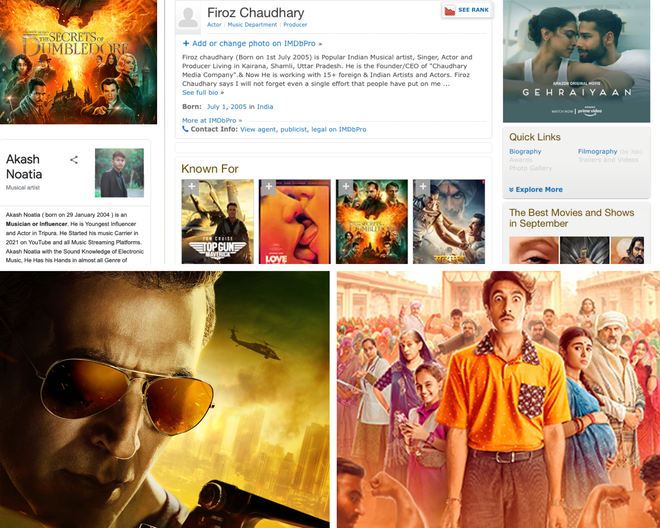I was casually browsing IMDb last month when I saw a name I didn’t recognise listed as the top cast alongside Ranbir Kapoor in the upcoming movie, Animal. It was clearly a case of IMDb vandalism. Any website that allows its users to add or edit content is vulnerable to this.
It was amusing at first, but a Google search confirmed that his wasn’t an isolated case. Many have figured out how to manufacture their online clout via the non-sweat route. At first I came across dozens. Then, as I better understood their methods, I found hundreds. Interestingly, over 95% of the profiles were from small town India. Is it because they don’t have as many resources as those in metros and are trying to get visibility and followers on social media platforms this way? The answer is not yet clear.
Gaming IMDb is only a tiny part of what is being done today. These ‘creators’ have added their profiles and biographies on many self-editing websites. They target websites that have high SEO ranking but lax or no content verification systems in place, such as IssueWire, FilmFreeway, and WikiAlpha, and feed misinformation. This tricks the Google search algorithm into believing these citations are legitimate proof of their notability — thus helping them get knowledge panels that, in turn, assist them in getting verified on other platforms (say, Spotify).
Also read | The game no one’s talking about: Internet manipulation is on the rise in India
The end goal seems to be to increase the surface area of their online influence. It’s hard out there for any budding content creator to build an audience. Having their own Google knowledge panel or getting verified on music distribution platforms gives them legitimacy in the eyes of their followers. This is a way of digital flexing.

Not everyone I found are imposters; some are content creators with a lot of followers on Instagram and YouTube. But most like Chaudhary and Noatia have found loopholes and used it to their advantage. Their social media followers (37.1k and 28k respectively) are surprising and suspect, especially considering Chaudhary has seven posts and Noatia a series of generic marketing tips. But having these numbers along with the verifications on other platforms must come in useful if they want to do collabs, engage with sponsors, or for more appalling things like asking for money, gifts, or favours from people — just by telling them, ‘Google me, I’m famous!’
The onus is on these multi-billion dollar valued platforms to have effective content verification and review systems in place. They have massive influence over our digital lives and they need to take greater responsibility for what gets published there.
Prashant Baid is a Bengaluru-based software engineer and writes a newsletter at peabee.substack.com. His latest post exposes how one cloud kitchen is operating multiple restaurant brands under the same FSSAI license. It has 189 on Swiggy and 127 on Zomato.







